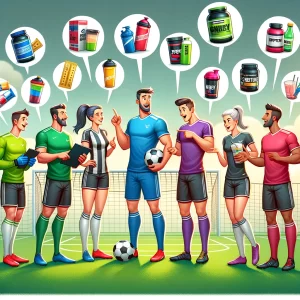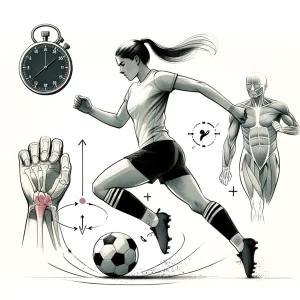
Caffeine and Soccer: Boost or Bust?
Whether it’s shaving a second off a sprint or perfecting the arc of a long pass, players and coaches are always looking for ways to enhance performance. One popular tool in this quest is caffeine, known for its ability to boost physical performance in various sports. But how does it affect cognitive functions like decision-making and pass accuracy in soccer? A recent study aimed to find out.
The Experiment: Caffeine vs. Placebo
Twelve young soccer players, aged 16-17, participated in a study to evaluate the impact of caffeine on their decision-making abilities and pass accuracy. Each player completed the tasks twice: once after consuming caffeine and once after taking a placebo. The caffeine dose was 3 mg per kilogram of body weight, a moderate amount known to influence physical performance.
The players underwent two main tests:
- Decision-Making Task: Players watched ten pre-recorded soccer scenarios and selected the best possible outcome.
- Passing Accuracy Test: Players performed short (10m) and long (30m) passes, as well as the Loughborough Soccer Passing Test (LSPT).
Key Findings: The Caffeine Conundrum
The results were intriguing but not definitive. Here’s a breakdown of the findings:
Pass Accuracy
- Short Passes: Players were 1.67% more accurate after consuming caffeine, though this was not statistically significant.
- Long Passes: Accuracy improved by 13.48% with caffeine, but again, this change wasn’t statistically significant.
Decision-Making and LSPT Scores
- Decision-Making: Players performed 7.14% worse in decision-making tasks after consuming caffeine.
- LSPT Scores: Scores dropped by 3.49% with caffeine, indicating a potential negative impact on complex passing tasks.
Implications for Coaches and Players
The study’s results suggest that caffeine’s effects on soccer performance are nuanced. While caffeine may slightly improve physical aspects like long passes, it might impair cognitive functions necessary for decision-making and complex tasks like those in the LSPT.
Understanding the Mixed Results
Why do these mixed results occur? Several factors could be at play:
- Dosage and Timing: The 3 mg/kg caffeine dose used in the study might be too low to significantly enhance cognitive performance, though it can affect physical aspects. Higher or sustained doses might be needed for more noticeable cognitive benefits.
- Task Complexity: Simpler tasks, like short passes, showed minimal improvement with caffeine. In contrast, complex tasks requiring higher-order thinking, such as decision-making and the LSPT, seemed to suffer.
- Individual Variability: Responses to caffeine can vary greatly among individuals. Some players might benefit more than others, depending on their habitual caffeine intake and sensitivity.
Practical Takeaways for Soccer Training
For soccer coaches and players, the key takeaway is that caffeine’s role in enhancing performance isn’t straightforward. While it might offer some physical benefits, its impact on cognitive tasks could be a double-edged sword.
Recommendations for Coaches
- Trial and Error: Experiment with caffeine during training sessions to observe individual responses before using it in competitive matches.
- Task-Specific Use: Consider using caffeine for activities requiring physical endurance, like long passes, while being cautious with tasks needing sharp decision-making skills.
- Monitor Dosage: Keep an eye on the dosage and timing of caffeine intake to find the optimal balance for each player.
Player Development Insights
For young players, understanding their body’s response to caffeine can be part of broader sports science education. Learning how different substances affect performance can help them make informed choices about their diet and training routines.
Conclusion: The Caffeine Dilemma
While caffeine remains a popular performance-enhancing substance, its effects on cognitive functions in soccer are still murky. Coaches and players should approach caffeine use with caution, considering its potential to both aid and impair performance. Future studies will hopefully provide clearer guidelines, helping athletes harness the benefits of caffeine without compromising their game intelligence.
Elevate your understanding of the beautiful game with ‘This Week in Soccer’.
Subscribe now to our newsletter and be part of a community that transforms theoretical knowledge into practical mastery. Don’t miss out on the chance to access groundbreaking insights and redefine your approach to soccer. Subscribe today!



